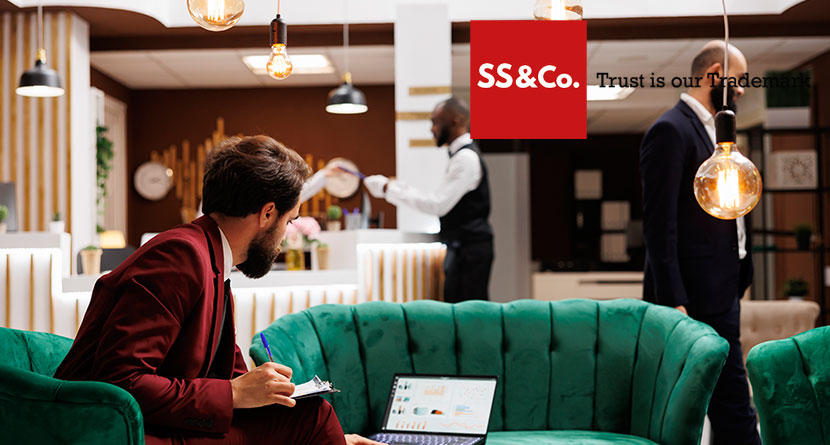If you run a restaurant or a hotel, this piece shows what to watch for and why working with specialist VAT consultants Dubai will save time and money.
What does the law say?
The UAE applies VAT to most goods and services at a standard rate of 5 percent. This includes many supplies made by restaurants and the accommodation and services sold by hotels. These are not edge cases; they are core taxable activities for the hospitality sector and should be treated as such in the accounts and on customer invoices.
A business must register for VAT if its taxable supplies and imports exceed the mandatory threshold of AED 375,000 per year. Businesses that do not meet that level can usually register voluntarily if their taxable supplies or expenses exceed AED 187,500. These thresholds are central to planning for restaurants and hotels. Missing a registration trigger creates penalties and interest.
Beyond the headline rate and thresholds, the law has detail. Bundled services, service charges, room rates that include meals, and company events bring additional rules. Whether a particular item is standard rated, zero-rated, or exempt can hinge on how the sale is structured and who the customer is. For hotels, accommodation itself is generally subject to the standard rate, but packaged deals and exported services require careful treatment. Recent reforms to the VAT executive regulations mean businesses must follow updated guidance and public clarifications.
Why do restaurants and hotels get tripped up?
Many issues come from simple operational choices. When a restaurant adds a service charge or packs a meal with complimentary parking, the accounting entry must reflect the VAT position of each component. When a hotel sells a room with breakfast, the room and the breakfast are often treated differently if one supply is considered ancillary. Mistakes commonly occur because front-of-house processes and accounting systems are not aligned. This is where disciplined control and training remove risk.
Small mistakes may double. A wrongly coded point-of-sale item, inconsistent invoicing, or the absence of proper tax invoices will create reconciliation gaps at filing time. Without proper records, the business cannot substantiate input tax recovery. For this reason, many operators seek advice from VAT consultants Dubai who specialize in the hospitality sector and can bridge the gap between operations and tax compliance.
The practical checklist every operator needs

First, determine whether you must register now or will cross the threshold soon. Second, ensure your point-of-sale, property management system, and accounting software apply VAT correctly to each category of sale. Third, maintain tax invoices and purchase invoices so you can support input tax claims. Fourth, standardize how you treat service charges and tips in policy and on receipts. Finally, document how you price bundled services and corporate packages.
These steps are straightforward, but they must be executed consistently. Many operators attempt this internally and succeed, but most find that the consistency and technical nuance required are best handled with external help. That is why a growing number of hospitality operators engage VAT consultants Dubai to set up systems, draft policies, and run training sessions for staff.
How VAT affects pricing, margins and customer communication
VAT is legally payable on taxable supplies, which usually means adding 5 percent to the customer price or making VAT clear on menus and invoices. The commercial impact matters. If a hotel or restaurant absorbs the VAT rather than displaying it as an extra charge, margins shift, and pricing decisions must be deliberate. If VAT is shown separately, guests see the tax component and accounting is cleaner.
Communicate clearly to customers. Show VAT on receipts and on bills. If you include VAT in the price, update your public menus and booking platforms so the advertised price is final. Each choice has accounting consequences and affects how you manage cash flow and input tax recovery. VAT consultants Dubai often helps draft customer-facing language and test the billing flow to avoid surprises.
Service charges, tips and VAT: a single, simple rule
Service charges that are compulsory and imposed by the business are generally taxable. Voluntary tips given directly to staff may be outside the tax base if the business does not take them into the till. The practical effect is that your payroll and cash handling rules must be aligned with your VAT policy. The rule is simple but the controls require operational discipline to apply correctly every day.
VAT consultants Dubai can test your processes and implement controls so the business treats service charges and tips consistently across restaurants, banqueting, and in-room dining. They also help design staff guidance to ensure tips that are intended to be direct are not accidentally recorded as business receipts.
Recovering input tax: documentation is decisive
You can recover VAT you paid on business inputs, subject to the normal rules. The recovery depends on holding valid tax invoices and being able to show that the purchases were for taxable business use. Hotels and restaurants have many VATable costs, food and beverage purchases, linen, utilities, and third-party services. The ability to reclaim input VAT depends on documentation quality and the correct apportionment when expenses serve mixed purposes.
If your accounting system cannot produce a reliable audit trail, an input tax review is a high-return exercise. VAT consultants Dubai frequently run these reviews and then help implement fixes to capture recoverable VAT that was previously lost or incorrectly recorded.
Filing, deadlines and what to expect from the FTA
VAT returns are typically filed quarterly unless the FTA requires otherwise. Returns must reconcile sales, purchases, and the VAT collected and paid. The FTA has updated guidance and clarifications that affect hospitality transactions, so operators must stay current. Recent legislative revisions and public clarifications mean that businesses should not treat historic practices as permanent. Periodic reviews and a compliance calendar will remove last-minute penalties.
When to bring in a specialist
Bring in a specialist if you do not have confidence in your systems, if you operate multiple outlets, if you run a mixed business model (for example, rooms plus dining plus events), or if you export services. Specialists add value by reducing risk and by finding tax efficiencies you may have missed. If you are expanding into corporate catering, events, or selling meals across borders, specialist input is especially valuable.
Selecting VAT consultants Dubai with hospitality experience matters. The best advisors will give you a clear roadmap, a fixed-scope project plan, and measurable deliverables like corrected mappings, staff training, and a clean filing process.
Final word
UAE VAT for Restaurants and hotels may seem straightforward, but it is quite detailed in practice. The rules are public and the FTA updates guidance from time to time. Systems, controls, clear receipts, and regular review are the actions that protect margins and avoid penalties. For most operators, partnering with experienced VAT consultants Dubai pays for itself through reduced risk, recovered VAT, and fewer disputes.
Our objective at SSCOGLOBAL. is simple i.e. to keep your business compliant, efficient, and focused on serving customers. For hospitality businesses, clear tax rules combined with disciplined processes are the fastest route to sustainable margins and fewer headaches.




